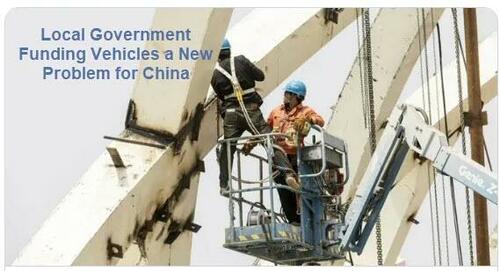Efforts To Halt China’s Real Estate Crash Will Only Lead To Further Collapse
Authored by Mike Shedlock via MishTalk.com,
Local Government Funding Vehicles are offering very high interest rates to fund infrastructure. The interest rates are not sustainable.
Tweet Thread by Michael Pettis
Very good article on a very worrying (but predictable) trend: “LGFVs are finding it difficult to borrow from banks and institutional bond investors, and are increasingly being forced to offer retail investors high interest rates to raise cash.”
Not only is it dangerous to push this very risky type of borrowing down to retail investors, but the rates are so high that even if the money were used to fund very productive infrastructure projects (and it isn’t), local governments won’t be able to service the debt.
But before criticizing local governments for dangerous behavior that will almost certainly come to a very bad end, spare a thought for the impossible position they find themselves in.
Revenues are way down (and unlikely to recover), COVID-related expenses are up, and they are tasked with delivering enough economic activity to generate unrealistically high GDP growth numbers. To make matters worse, Beijing has imposed debt restrictions on them.
So what else can they do? As I have long argued, China’s rising debt burden is the inexorable consequence of a growth strategy that requires GDP growth rates far in excess of what China’s very unbalanced economy can sustainably deliver.
A soaring debt burden and increasingly risky debt structures are not bad outcomes caused by dishonest and incompetent individuals. They are fundamental to the way the growth model works.
Real Estate Crumbling
The pillars of strength in China’s property bond market are crumbling.
The dollar bond selloff that began with Evergrande, and decimated nearly all weaker developers, is now threatening investment-grade giants like Vanke that until this week seemed insulated. 3/6 pic.twitter.com/uoK43tKio0
— Rebecca Choong Wilkins 钟碧琪 (@RChoongWilkins) July 14, 2022
Bank stocks are tumbling on escalating risks.
Non-performing loans triggered by refusals to pay mortgages could reach $83 billion. Chinese authorities have even held emergency meetings with banks. 5/6 pic.twitter.com/rGHMw8FaFz
— Rebecca Choong Wilkins 钟碧琪 (@RChoongWilkins) July 14, 2022
Weak home price trend, weak secular outlook and high portion of household assets in property, add up to weak consumption.https://t.co/a8yuPeZPhs pic.twitter.com/WeVVZWBmmX
— Steve (@ssinvestments8) July 14, 2022
Xi Reaffirms Growth Target That Analysts Say Is Out of Reach
Bloomberg reports Xi Reaffirms Growth Target That Analysts Say Is Out of Reach
Chinese President Xi Jinping pledged to meet economic targets for the year even as the government’s zero tolerance approach to combating Covid outbreaks and a weak housing market put the growth goal further out of reach.
“This is the first comment from senior policy makers on ‘striving to achieve full year economic targets’ in recent months,” Goldman Sachs Group Inc. economists including Maggie Wei wrote in a note. “While growth recovery appears to have accelerated in June, barring dramatically more policy easing, we think the ‘around 5.5% GDP growth’ target remains extremely challenging this year.”
China Increases Subsidies and Fiscal Stimulus to Boost Consumption
Also consider my May 30, post China Increases Subsidies and Fiscal Stimulus to Boost Consumption
In contrast to the rest of the world, China and Japan are in stimulus mode.
Debt Implosion
Housing has gone bust but China’s president, Xi Jinping, has mandated a 5.5% growth target that will not be met.
Expect another debt implosion in China. This one will be fueled by interest rates so high that local governments will be unable to service the debt.
* * *
Tyler Durden
Mon, 07/18/2022 – 09:14

